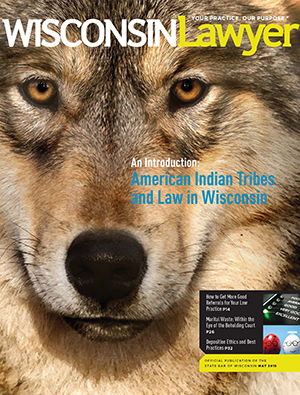 May 11, 2015 – Wisconsin is home to 11 federally recognized Indian tribes. Whether or not your law practice overlaps with Indian law, an introduction can help Wisconsin lawyers understand tribes’ unique status and their self-governing rights.
May 11, 2015 – Wisconsin is home to 11 federally recognized Indian tribes. Whether or not your law practice overlaps with Indian law, an introduction can help Wisconsin lawyers understand tribes’ unique status and their self-governing rights.
Attorneys Rebecca Webster, Andrew Adams III, and David Armstrong wrote “An Introduction to American Indian Tribes and Law in Wisconsin,” the cover story for the May Wisconsin Lawyer, which explains the history that has led to tribes’ current status.
From the trilogy of High Court cases establishing Congress’s power with respect to Indian tribes, to policies on allotment and assimilation, from sovereignty and self-determination, to tribal jurisdiction today, the authors cover this important history.
In addition, they explain how tribal courts work in conjunction with Wisconsin state courts, noting that “90 percent of litigants in tribal courts are unrepresented, in large part because of the relatively small number of lawyers practicing in tribal courts.”
The authors – a staff attorney with the Oneida Law Office, a chief justice of two tribal supreme courts, and a director of Wisconsin Judicare’s Indian Law Office – note that Indian tribal people and tribal communities face unique challenges due to their historical, legal, and political relationships with the federal government and the states.
And, don’t miss the article’s dramatic wildlife photography, from Oneida Tribe member Scott Denny.
Marital Waste: Impacting Property Division in Divorce Cases
Wisconsin’s family law statutes contain a presumption that a couple’s property will be equally divided at separation or divorce and generally require the use of percentage guidelines for purposes of setting child support. But courts can deviate from that.
For instance, a court could consider marital waste, defined as the intentional squandering or destruction of marital property by a spouse. But in “Marital Waste: Within the Eye of the Beholding Court,” attorney Sara Gehrig explains that it’s difficult to predict how a court will decide disputes involving allegations of marital waste.
“Case law and statutes provide some guidance, but as with many other family law issues, determinations of waste tend to be more fact driven than based on hard and fast rules regarding what constitutes a waste of marital assets and what does not,” writes Gehrig, a partner at Nowlan & Mouat in Janesville.
Her article suggests strategies for effectively representing divorcing clients who might have wasted marital assets, or who believe their spouse wasted assets.
Deposition Ethics: Keeping Things Civil
With no judge in sight, lawyers may be tempted to engage in harassing or obstructive tactics during depositions. But in “Out of Sight, Not Out of Mind: Deposition Ethics and Best Practices,” Judge Michael Aprahamian and attorney Jesse Beringer remind lawyers that discovery and ethics rules still apply in deposition proceedings.
And the authors note that, unlike the past, courts are becoming more assertive in sanctioning obstructionist conduct, increasing the costs associated with such tactics.
But what lawyers should remember is that “all interactions with opposing counsel during the deposition must be courteous and respectful, even if opposing counsel’s actions may be egregious and constitute sanctionable misconduct,” the authors write.
Columns and Insights
As I See It column: “We cannot accept the status quo,” says ABA President William C. Hubbard in, “It’s Time for Creative Disruption.” Like Martin Cooper, who invented the mobile phone, lawyers must strive to be creative innovators to bring more legal services to more people, Hubbard notes. “We must lead the way to ensure that change will increase access to justice while broadening opportunities for lawyers, protecting the public, and preserving our professional independence,” Hubbard writes.
101 column: In “How to Get More Good Referrals for Your Law Practice,” attorney and writer Mary Lokensgard says getting good referrals requires a good plan. She provides tips on determining who to ask for referrals and building your referral relationships.
Ethics column: In “Monitor Content, Not Source, of Professional Endorsements,” attorney Dean Dietrich discusses the ethical implications of receiving “endorsements” through LinkedIn, noting that statements about a lawyers services cannot be false or misleading. Dietrich is chair of the State Bar’s Professional Ethics Committee.
Solutions column: Bonnie Shucha, an assistant director at the U.W. Law Library, provides helpful tips on performing tribal law research in “Engaging the Third Sovereign: The Nature, Reach, and Sources of Tribal Law.” Different from Indian law, tribal law is the law Indian tribes develop and apply to their members and territories.
Technology column: Do you run a small law firm with no one to answer phone calls? Through virtual receptionists, lawyers can contract for these services without adding staff. Tyson Rhine, advisor to the State Bar’s Law Office Management Assistance Program, explains in “Project a Professional Image Using a Virtual Receptionist.”
Managing Risk column: Thinking about suing your client, who won’t pay your fees? In “Look Before You Leap,” attorney Tom Watson, vice president at Wisconsin Lawyer Mutual Insurance Company, discusses the risks involved in doing so, and the some steps lawyers can take to prevent fee disputes from occurring in the first place.
Final Thought column: “There was probably a whole list of reasons why I was let go, but the most apparent one was that I was too openly disgruntled,” writes attorney Brandon Evans in “I Got Fired.” Evans, now gainfully employed in Marquette, Mich., tells his story to caution lawyers who are not satisfied in their jobs.
